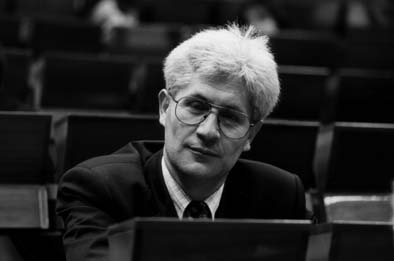Personal tools
News from ICTP 90 - Profile

Seifallah Randjbar-Daemi, who has been associated with the Centre for some 20 years, is currently head of the ICTP High Energy Physics Group.
Seif on Science

"I first met Abdus Salam at Imperial College in London in 1976, when I was looking for a supervisor for my thesis," recalls Iranian-born Seifallah Randjbar-Daemi, head of the ICTP High Energy Physics Group. "Salam was spending most of his time in Trieste or travelling; so, I eventually ended up working with Thomas Kibble."
Randjbar-Daemi's thesis focused on quantum gravity, and after completing it in 1980, he arrived at ICTP in the fall as a postdoc. "That's when my collaboration with Salam truly began. I would continue to work closely with him until 1993, when Salam's illness made it impossible for him to continue."
In characteristic fashion, Salam pushed Randjbar-Daemi in several different directions at one time. "In addition to our joint research projects," he notes, "Salam asked me to lecture at the Centre's schools and workshops and to consult with him on a wide range of issues."
Then, in 1988, Salam asked Randjbar-Daemi to join the Centre as a staff member. Within two years, he was placed in charge of the High Energy Group, a position he has held ever since.
With five staff members and 10 post-docs, Randjbar-Daemi's group is the largest research group at the Centre. In addition to its training activities, the group has built a solid reputation for research, especially in the fields of particle physics, string theory and cosmology.
"Most Islamic countries," Randjbar-Daemi observes, "have a good tradition of learning. But," he adds, "this tradition by itself is not sufficient. Progress in modern science requires the encouragement of innovation and strengthening of mechanisms that foster creativity. These elements are missing in most developing countries and Islamic countries are no exception."
"Because not a single Islamic country's scientific output is comparable to the scientific output in advanced countries, some observers conclude that science and Islam are mutually incompatible. I do not believe this is correct," he says. "Over the past centuries, scientists from Islamic culture have made significant original contributions to the development of the natural sciences and mathematics."
"In our times," Randjbar-Daemi adds, "many scientists from Islamic countries have built successful careers in scientifically advanced nations. Some, in fact, have reached the pinnacle of their professions. The best known example is Abdus Salam who was both a devout Moslem and one of the outstanding scientists of our time."
Randjbar-Daemi also acknowledges that the public may currently find other branches of science-for example, genetic engineering and the environmental sciences-more engaging than theoretical physics. He maintains, however, that this is not a new phenomenon. "Quantum mechanics apparently never made big headlines during the first three decades of this century when its basic principles were being discovered. Yet, hardly any aspect of modern life in industrialised society fails to make use of the principles of quantum theory."
Moreover, Randjbar-Daemi does "not fully agree that theoretical physics no longer excites the public imagination." The public, he notes, finds astrophysics and cosmology, which have important theoretical aspects, quite interesting. "Dark matter and to a lesser extent black holes are purely theoretical concepts for now; yet, that's not prevented them from becoming among the hottest topics of discussion in popular scientific magazines. And just last year, physicist Brian Greene's Elegant Universe, a non-technical account of string theory, became a best-seller on both sides of the Atlantic."
Randjbar-Daemi also finds the increasing use of physics and mathematics in other fields promising. "Throughout history," he observes, "the cross-fertilisation of concepts and ideas has nurtured progress in all fields, and science is no exception. The soft boundaries between mathematics, physics and engineering helped clear a path for the technical progress that has been the hallmark of modern society. Now the same dynamic may be taking hold between mathematics, physics and other sciences like economics."